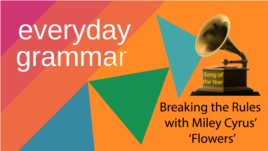29 February 2024
Every year, the Recording Academy in the United States gives awards to the performers and songwriters with the most outstanding achievements from the year before. The Academy calls those awards "the Grammys."
At the 2024 Grammy awards, the Song of the Year award went to Miley Cyrus for her song Flowers. In today's lesson, we will look at some grammar rules Cyrus follows in the song and one rule she breaks. The song begins with the story of a break-up:
We were good, we were gold
Kinda dream that can't be sold
We were right 'til we weren't
Built a home and watched it burn

Everyday Grammar: Breaking the Ruke With Miley Cyrus' 'Flowers'
Mm, I didn't wanna leave you
I didn't wanna lie
Started to cry, but then remembered I...
In this first part, Cyrus uses an informal adverb, "kinda," to describe the dream she and her partner had. In formal language, she would say, "It was the kind of dream that can't be sold." We expect to hear informal language in songs, so this is not really breaking any rules.
She follows with another informal word, the verb form "wanna," in "I didn't wanna leave you, I didn't wanna lie." It is very common to hear this pronunciation in spoken English of the words "want to."
Reflexive pronoun rule
Next, we get to where Cyrus follows and breaks the same rule. She describes the expressive actions of a romantic partner that she can do for herself. Her song tells us about the kinds of things a romantic partner might do, but Cyrus says she, as an independent woman, can do those things without the partner.
Listen for the reflexive pronoun "myself" in these lines:
I can buy myself flowers
Write my name in the sand
Talk to myself for hours
Say things you don't understand
I can take myself dancing
And I can hold my own hand
Yeah, I can love me better than you can
Did you catch the place where she broke the rule about when to use a reflexive pronoun? The rule is: when the object and the subject of the verb are the same, use the reflexive pronoun to describe the object.
Cyrus follows this rule when she sings, "I can buy myself flowers," "talk to myself for hours" and "I can take myself dancing." But she breaks it when she sings, "I can love me better than you can."
Let's take a moment for a little quiz here. Can you say or sing the same line with the reflexive pronoun? Take a moment so you can think.
Following the rule, this should be "I can love myself better than you can." Cyrus probably uses "me" to match the beat of the music. Often, that is more important to singers than following grammar rules!
Adjective "own"
In one line of the song, Cyrus uses the adjective "own" to refer to things belonging to herself. Let's listen to that line:
And I can hold my own hand
Here, "own" is correct because it makes the action clear. If she had not used "own," we might not understand. She could be singing about holding her hand up, for example. "Hold my own hand" makes it clear to us that she is using one hand to hold another.
What do you think of Miley Cyrus' song? Are there any singers in your country who sing about their independence in this way?
Write to us at learningenglish@voanews.com and tell us about them.
And that's Everyday Grammar!
I'm Jill Robbins.
Jill Robbins wrote this lesson for Learning English.
______________________________________________
Words in This Story
achievement – n. something accomplished, especially by superior ability, special effort, or great courage
reflexive (pronoun) – adj. a class of pronouns that refer back to the subject of a sentence or clause